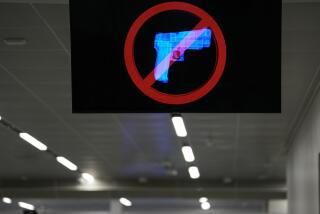Supreme Court Strikes Down Law Targeting Gays
WASHINGTON — In a landmark victory for gay rights, the Supreme Court on Monday ruled that gays and lesbians may not be singled out for official discrimination simply because of “animus” toward their sexual orientation.
The justices struck down a Colorado initiative that would have allowed employers and landlords to exclude gays. The measure would have done so by overturning anti-discrimination ordinances in several Colorado cities and forbidding cities and the state Legislature to pass such measures in the future.
The initiative, passed by the state’s voters in 1992, violates the U.S. Constitution’s clause that guarantees all persons the “equal protection of the laws,” the court said.
The 6-3 ruling marks the first time that the high court has treated gay rights as a matter of civil rights. And its opinion is likely to have a broad impact.
On matters ranging from the military and school teaching to marriage and custody laws, different treatment for gays is often justified based on moral disapproval of homosexuality.
Monday’s opinion strongly suggests that group hostility and prejudice alone cannot justify discrimination by law, and legal experts said that the court’s reasoning gives gay rights advocates a powerful weapon for challenging all types of discriminatory treatment.
But for all its reach, the decision stops well short of saying that all legal discrimination based on sexual orientation is barred by the same blanket prohibition as discrimination based on race or gender.
“This doesn’t resolve all the other cases but it means the courts are now willing to listen” to claims of gay rights, said Harvard law professor Laurence H. Tribe.
Stanford law professor Kathleen Sullivan said that the court’s ruling will make it much harder for states to defend their laws against same-sex marriages and for the Defense Department to uphold its policy excluding openly gay soldiers in the ranks.
President Clinton’s “don’t ask, don’t tell” policy on gays in the military is under attack in several lower federal courts.
“If hostility and hatred toward gays is not a rational basis [for upholding these laws], it means the government faces an uphill fight,” Sullivan said.
*
Both as a symbol and in its legal reasoning, Monday’s opinion signifies a profound shift in attitude at the high court.
Just a decade ago, the court upheld a Georgia anti-sodomy law and its opinion rejected the claim that gays were entitled to the same fundamental rights as other Americans as “facetious at best.”
That decision, in Bowers vs. Hardwick, has been repeatedly cited as a basis for allowing discrimination against gays. In the years since, the justices regularly have refused to hear appeals from military personnel, schoolteachers and others who lost their jobs because of bias against gays.
Lest anyone doubt that the court planned to make a landmark announcement Monday, Justice Anthony M. Kennedy began his opinion by citing the words of Justice John Marshall Harlan in his famous dissent in the Plessy vs. Ferguson case, handed down 100 years ago this month.
In that case, as the rest of the court upheld the Southern states in forcing blacks into segregated facilities, Harlan proclaimed that the Constitution “neither knows nor tolerates classes among citizens,” a view that finally gained a majority on the court in the mid-20th century.
Harlan’s “words now are understood to state a commitment to the law’s neutrality where the rights of persons are at stake,” said Kennedy. “A state cannot deem a class of persons a stranger to its laws.”
Colorado’s voters tried to do just that in their 1992 amendment, he said.
According to its words, gays, lesbians and bisexuals were not entitled to a “protected status” and cannot bring any “claim of discrimination” based on their sexual orientation in matters of housing, employment and public accommodations. Sponsored by a group known as Colorado for Family Values, Amendment 2 won a 53% to 47% vote of approval. But because of court challenges, it has never gone into effect.
“It is not within our constitutional tradition to enact laws of this sort . . . [that] single out a certain class of citizens for disfavored treatment,” said Kennedy.
The Colorado amendment “imposes a special disability” upon gays alone that “is born of animosity,” he said. “We must conclude that Amendment 2 classifies homosexuals not to further a proper legislative end but to make them unequal to everyone else. This Colorado cannot do.”
His opinion (Romer vs. Evans, 94-1039) was joined by Justices John Paul Stevens, Sandra Day O’Connor, David H. Souter, Ruth Bader Ginsburg and Stephen G. Breyer.
Of those, perhaps most significant were the votes of Kennedy and O’Connor, two moderate conservatives named to the high court by President Reagan. In cases involving matters of discrimination, both have insisted on a strict equal treatment standard that does not permit distinctions based on irrelevant factors.
Sometimes, this has been viewed as liberal, such as when they voted to say that jurors may not be excluded based on their race or gender. Other times, it has been viewed as conservative, such as when they combined to strike down federal contracting laws that gave preferences to blacks and Latinos.
In dissent, Justice Antonin Scalia criticized his colleagues for “taking sides in a cultural war.”
“Coloradans are entitled to be hostile toward homosexual conduct,” Scalia said, just as they are entitled to pass laws that restrict the rights of “drug addicts or smokers or gun owners or motorcyclists.”
“Today’s opinion has no foundation in American constitutional law and barely pretends to,” said Scalia, whose dissent was joined by Chief Justice William H. Rehnquist and Justice Clarence Thomas.
*
Not surprisingly, gay rights lawyers were greatly cheered.
“Today’s decision marks a sea change in the struggle of lesbian and gay men for equality in America,” said Matt Coles, director of the ACLU’s Lesbian and Gay Rights Project. It “puts government on notice that laws based on hostility to gays and lesbians--or any other group--will not be tolerated.”
By contrast, Colorado for Family Values called it a “truly chilling day” when defenders of “traditional views of sexuality” cannot write their views into law.
“They hated no one, but merely wanted to keep government out of the business of legislating private decisions,” members of the group said.
More to Read
Sign up for Essential California
The most important California stories and recommendations in your inbox every morning.
You may occasionally receive promotional content from the Los Angeles Times.











